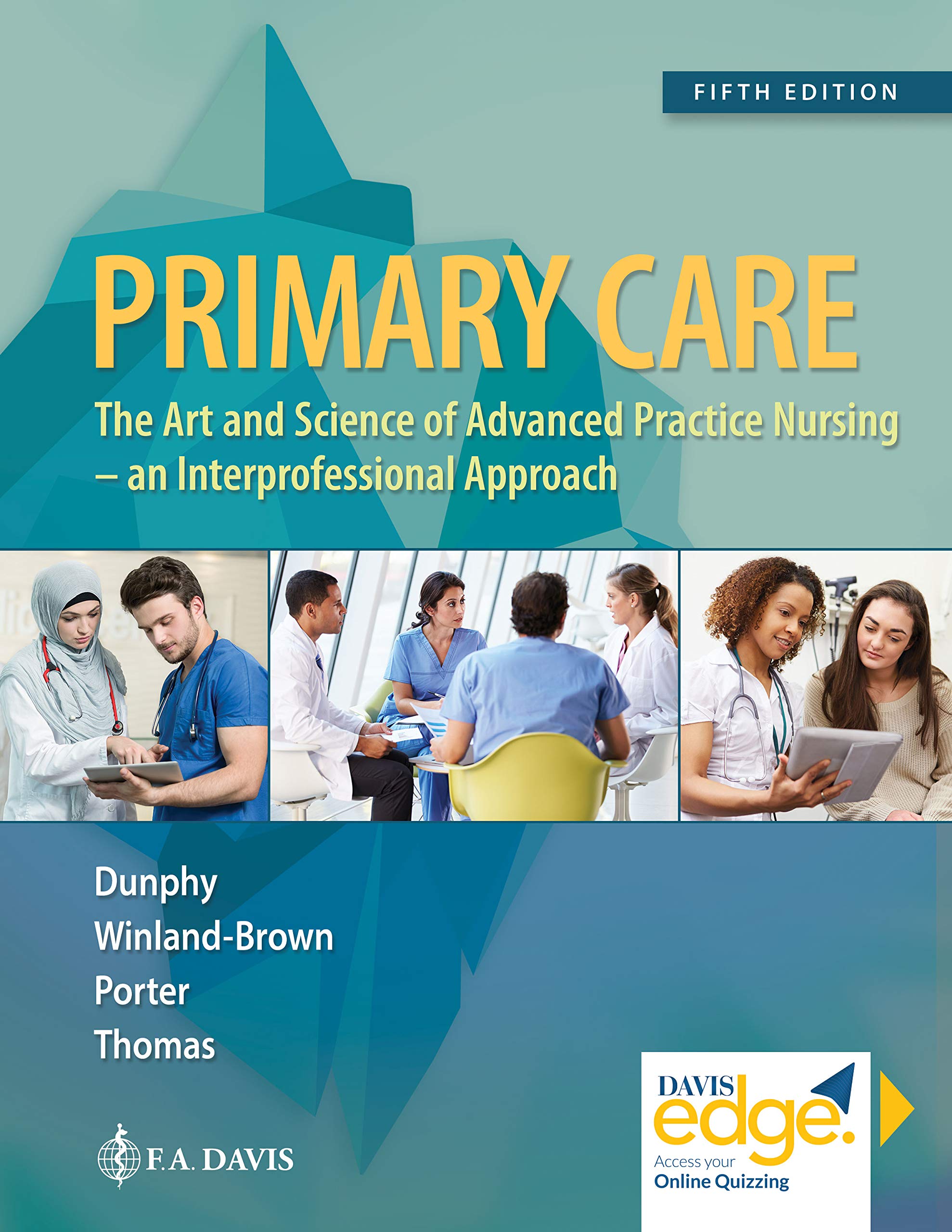Primary Care Art and Science of Advanced Practice Nursing 5th Ed Test Bank
Digital item No Waiting Time Instant DownloadChapters: 82Format: PDFISBN-13: 978-0803667181ISBN-10: 0803667183Publisher: F.A. Davis Company; Fifth editionAuthors: Lynne M. Dunphy, Jill E. Winland-Brown,Brian Oscar Porter, Debera J. Thomas
In Stock
Original price was: $55.00.$15.00Current price is: $15.00.
Primary Care Art and Science of Advanced Practice Nursing 5th Ed Test Bank
Primary Care: The Art and Science of Advanced Practice Nursing, 5th Edition – Test Bank
Overview:
The Test Bank for Primary Care: The Art and Science of Advanced Practice Nursing (5th Edition) is an essential study and review resource designed for students and professionals in advanced practice nursing. This edition provides a comprehensive set of questions that reflect the latest developments and best practices in primary care.
Key Features:
- Varied Question Formats:
- The test bank includes multiple-choice questions, true/false statements, fill-in-the-blanks, and case-based questions. This variety helps assess a broad spectrum of knowledge and skills.
- Detailed Answer Explanations:
- Each question is followed by an in-depth explanation of the correct answer and rationale for why other options are incorrect. This helps deepen understanding and reinforces learning.
- Alignment with the 5th Edition:
- Questions are specifically crafted to align with the content of the 5th edition of the textbook, ensuring that they are relevant to the current edition’s material.
- Focus on Advanced Practice Nursing:
- Emphasizes the core concepts of advanced practice nursing in primary care, including assessment, diagnosis, treatment, and management of common health conditions.
- Up-to-Date Content:
- Reflects the latest research, guidelines, and best practices in primary care. Incorporates recent advancements in clinical practice and healthcare delivery.
- Clinical Application:
- Questions are designed to test not only theoretical knowledge but also practical application in clinical scenarios. Includes case studies and situational questions that reflect real-world challenges in primary care.
- Evidence-Based Practice:
- Emphasizes the importance of evidence-based practice in making clinical decisions. Questions cover how to apply research findings to improve patient outcomes.
Content Breakdown:
- Introduction to Primary Care:
- Overview: Questions cover the fundamental principles and roles of advanced practice nurses in primary care. Topics include the history of primary care, the scope of practice, and professional responsibilities.
- Models of Care: Explores different models of primary care delivery, including patient-centered medical homes and collaborative care models.
- Health Assessment:
- Assessment Techniques: Questions on comprehensive health assessments, including physical examinations, patient history taking, and diagnostic techniques.
- Special Populations: Focuses on health assessment for specific populations, such as children, elderly patients, and individuals with chronic conditions.
- Diagnosis and Management:
- Clinical Diagnosis: Questions on the diagnostic process, including differential diagnosis and the use of diagnostic tools and tests.
- Treatment and Management: Covers the management of common health conditions, including pharmacologic and non-pharmacologic interventions.
- Primary Care for Chronic Conditions:
- Chronic Disease Management: Questions on the management of chronic diseases such as diabetes, hypertension, and asthma. Includes strategies for monitoring and managing long-term health conditions.
- Preventive Care: Focuses on preventive measures, including screening, vaccinations, and health promotion strategies to prevent chronic conditions.
- Pharmacology in Primary Care:
- Pharmacologic Principles: Questions on the principles of pharmacology, including drug classifications, mechanisms of action, and side effects.
- Medication Management: Covers the prescription and management of medications in primary care, including drug interactions and patient education.
- Patient Education and Counseling:
- Education Strategies: Questions on effective patient education techniques, including communication strategies, health literacy, and motivational interviewing.
- Counseling: Focuses on counseling techniques for various health issues, including lifestyle changes, mental health support, and chronic disease management.
- Ethical and Legal Considerations:
- Ethics in Primary Care: Questions on ethical issues in primary care, including informed consent, confidentiality, and ethical decision-making.
- Legal Aspects: Covers legal considerations in primary care practice, including scope of practice, liability, and documentation requirements.
- Interprofessional Collaboration:
- Collaboration: Emphasizes the importance of working with other healthcare professionals to provide comprehensive care. Includes questions on teamwork, communication, and coordination of care.
- Referrals and Consultations: Focuses on the process of making referrals and consultations with specialists and other healthcare providers.
- Health Policy and Management:
- Health Policy: Questions on the impact of health policies on primary care practice, including policy analysis and advocacy.
- Practice Management: Covers aspects of managing a primary care practice, including financial management, quality improvement, and patient care coordination.
- Research and Evidence-Based Practice:
- Research Methods: Questions on conducting and interpreting research relevant to primary care. Covers research design, methodology, and application of findings.
- Evidence-Based Practice: Emphasizes integrating research evidence into clinical practice to improve patient outcomes and enhance the quality of care.
Applications:
- For Nursing Students:
- The test bank is a valuable study aid for nursing students in advanced practice programs. It helps in preparing for exams and understanding the application of primary care concepts in clinical settings.
- For Advanced Practice Nurses:
- Practicing advanced practice nurses can use the test bank to review and update their knowledge on primary care principles and practices, ensuring they are up-to-date with current standards.
- For Educators:
- Instructors can use the test bank to create quizzes, exams, and other assessments that align with the textbook content, providing a comprehensive evaluation of student understanding.
Conclusion:
The Test Bank for Primary Care: The Art and Science of Advanced Practice Nursing (5th Edition) is a comprehensive resource for those studying or practicing advanced practice nursing. Its diverse question formats, detailed explanations, and focus on current practices make it a valuable tool for both academic and professional development in primary care nursing.


Reviews
There are no reviews yet.